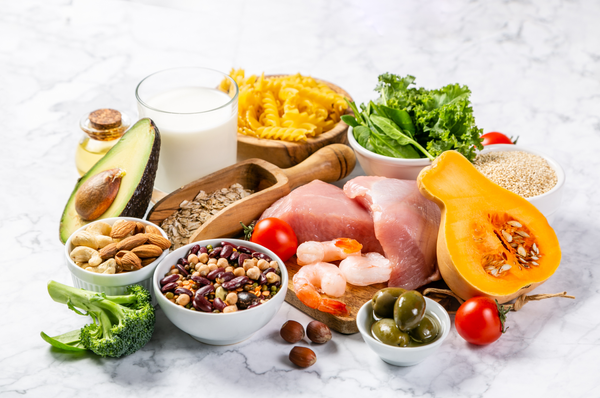6 ways to eat your way to better mental health
by Ellen Hart, LiveLighter Campaign Senior Coordinator
- October 7, 2021
- Leave a comment
- Health professionals
- Healthy eating
- Top Tips
- Mythbusting
- Fruit and Vegetables
- Junk Food
- Psychology
- Wellness
- Mental Health
- Nutrition Facts
Mental Health Week is celebrated each year in October around World Mental Health Day on October 10. It aims to promote mental wellbeing in the community by raising awareness of mental health issues, providing tips for self-care, reducing the stigma associated with seeking support and encouraging us all to look out for one another. This year, Mental Health Week in Western Australia will run from 9 - 16th October.
Mental and physical health go hand in hand. We are beginning to understand more and more about how our mind and body are connected and can impact each other, for better or worse. You can read more about that over here, or, for the practical stuff, read on!
Spoiler alert: there’s no single food that we can recommend for good mental health. It’s all about eating a range of wholesome foods, most of the time. That phrase ‘most of the time’ is important – it’s okay to have a piece of cake occasionally! Stressing too much about everything that goes into our mouth can be bad for mental health too. If you feel like food, body weight or body shape is taking up a lot of your mental space, or if it’s affecting your ability to do everyday activities or interact and socialise with others, it might be time to seek help. We recommend seeking the help of a trusted GP or getting in contact with the Butterfly Foundation.
The tips below will probably sound familiar to you as they’re pretty much the same as what is recommended for good physical health. Mental health experts have a great phrase that sums this up – ‘what’s good for your heart is good for your brain.’
Here are six ways to eat for better mental health:
1. Follow a ‘traditional’ dietary pattern
The Mediterranean diet has the most research behind it but others like the Norwegian or Japanese diet are also showing promise. Research with over 5000 adults in Norway found that a traditional Norwegian diet was associated with reduced depression in women and reduced anxiety in men. Whole foods and minimally processed foods are a cornerstone of all these dietary patterns – because they have been around way longer than ultra-processed foods.

2. Eat plenty of vegetables and fruit
Aim for five serves of veg and two serves of fruit each day. Results from a systematic review of individual studies showed that high intakes of fruit, vegetables, fish and whole grains are linked to a reduced risk of depression. Find out how to get more vegies and fruit in your day, or see our top tips to make your vegetables and fruit last longer.
3. Choose wholegrains over highly processed carbs
Choose brown rice instead of white rice, wholegrain or wholemeal bread instead of white bread and swap sugary cereals for wholegrain options. Pro-tip: replace half the white flour with wholemeal flour when baking to give your baked goods an extra boost of fibre.
4. Eat more legumes, nuts and seeds
Legumes include lentils, beans and peas. Legumes are a great source of fibre which as we know keeps our gut happy! Not sure what to do with a lentil? Check out our tasty collection of legume recipes.
5. Aim for 2-3 serves of fish each week
Fish, especially oily varieties like salmon, sardines, and mackerel, contain high amounts of long-chain omega-3 fatty acids, which may play a role in reducing inflammation. Vegetarian sources of omega-3 fatty acids include chia seeds, hemp seeds, flaxseeds, walnuts and canola oil.
6. Swap junk foods for nutritious alternatives
When we are feeling low or stressed we might find ourselves reaching for our “comfort foods” – for many of us that’s foods such as chips and chocolate. This is because we are biologically more likely to crave carbs, salt and sugar when we experience these feelings. These foods may help us to feel better in the short-term but can make us feel worse in the long run. We’ve got a whole blog dedicated to making gooey, creamy, satisfying and healthy comfort foods here.
A note on movement and mood
Getting enough physical activity into the day can also have a big influence on our mood. Some studies have even shown exercise to be as effective as anti-depressants for mild depression! Moving your body gets heaps of feel-good brain chemicals pumping like endorphins and serotonin. Exercise can also help us sleep (and we know good quality sleep is also important for mental health). Find an activity that you like (so that you’ll want to keep doing it!) and try and work up to at least 30 minutes of movement on most days.
Need some inspiration? Learn more about the benefits of exercise for mood here and check out these fun exercise ideas.
The take home
Looking after our mind is just as important as looking after our body. While it’s not possible to fully protect ourselves against mental illness, making small changes to our food and movement habits can reduce our risk of developing mental health issues and can help us to manage the symptoms. To read more on the link between diet and mental health, check out this blog.
It’s important to seek support from your GP if you are concerned about your mental health or have ongoing feelings of sadness, anxiety or worrying thoughts that are affecting your ability to go about your daily life. Your GP will be able to talk through your options with you.
For more information on mental health and mental illness click here.







